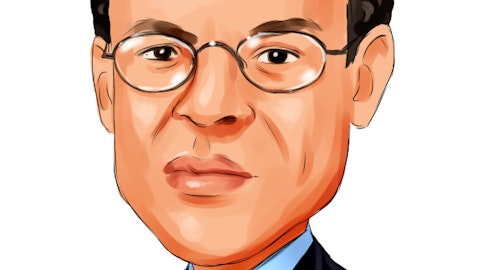Jim Foster: Yes. So on the Fish and Wildlife situation, so there was all sorts of contradictory and probably erroneous information about what Cambodia was doing after this first farm was invited back in November. So the initial ruling was that the Cambodian government just closed down exports, which was we don’t believe was ever true. So Cambodia is €“ from their end, is open for business. We’d like to shift the animals, we’ll provide the paperwork. The U.S. government is saying, you can’t bring them in yet. And the ones that you have in country, and we have some in country, you can’t use yet until we sort of work out and ensure that they are indeed purpose-bred. So no. So I don’t think it’s €“ I don’t think we can just do what we want.
I mean, there’s always permitting. There are these site permits that one has to get and then they €“ when they €“ so canceled, you can go ahead and utilize the animal. So just your prevalence, I guess our hands are tied, but we’re trying to look at that positively that it’s within our control to get them untied. They’re just going to sort of wait for us to make a proposal on how we can prove they’re purpose-bred. So as I said, that’s like 100% of our focus right now in our control. And obviously, the faster we do it, the faster they will allow us to utilize the animals. CDMO business is an interesting one. As we’ve spoken to consistently for a while, now integration has been complicated. The science is quite complicated and new. And we really had to re-staff all three of the companies, the major companies that we bought from kind of top to bottom, senior management, sales, regulatory, et cetera.
I think the demand has been great across the Board. The sales cycle is long. So I’m not sure that was totally clear to us or the length wasn’t crystal clear to us when we bought the company and plus some of the clients that we felt we had firm commitments weren’t so firm. So I think we’ve done a great job with the new sales force where people that understand the science can explain it well. And we have in our prepared remarks a commentary $100 million of new business come in last year. Our Memphis facility, which is a gene-modified cell therapy manufacturing operation, this sounds particularly solid right now just in terms of numbers of clients, scale of clients. By that, I mean, there’s a bunch of companies that are cell therapy companies that are kind of small and new that you’ve never heard of, but there’s a bunch of really big companies, including big biotech and big pharma who either don’t have their own space or don’t feel there’s sufficient space in the system.
We have several clients that we’re talking to who have either finished Phase 3 or almost €“ who are talking to us about commercial quantities. And there’s at least one client that we are confident that we will produce commercial quantities for them this fiscal year, which obviously would be fabulous just in terms of, I don’t know, expertise, reputation, capability and really doing it because there’s still a few commercial products actually being manufactured. So the business feels better, stronger, better demand, better client understanding of who we are, better integration amongst and between the cell and gene therapy companies and also between cell and gene therapy and our biologics business, in particular, and I would say safety. Secondarily, we have very good facilities that have been all three of the big €“ three of the major facilities have been added on to over the past year.





